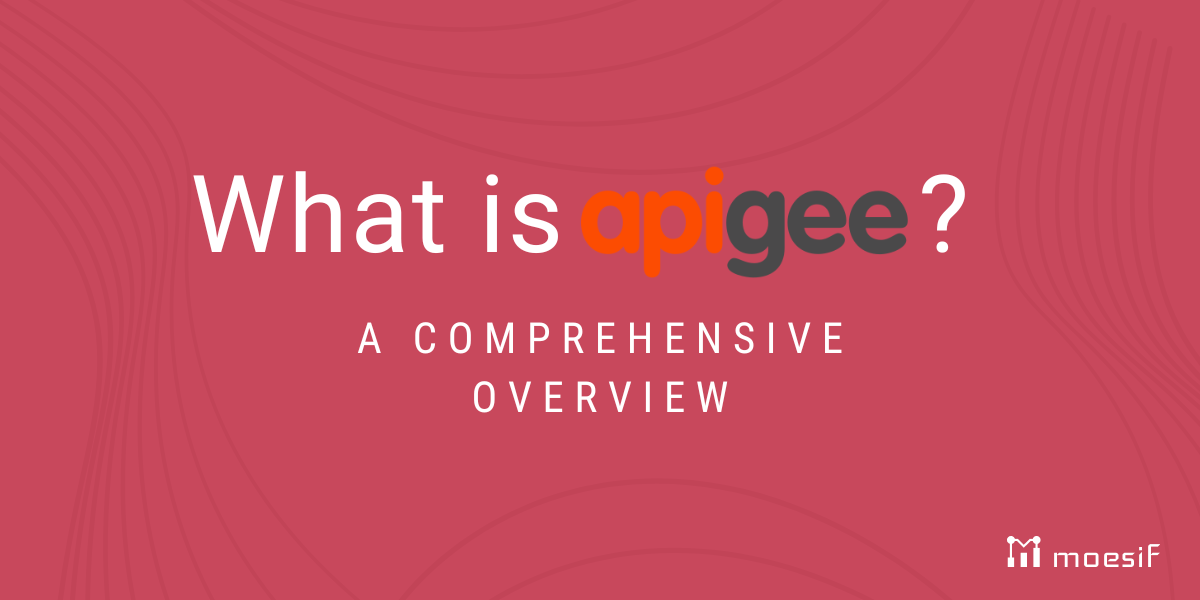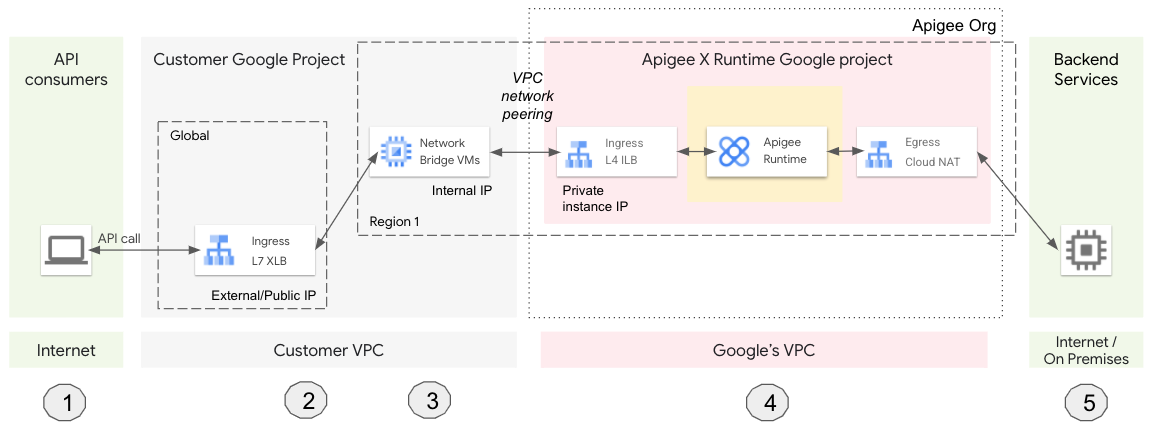What is Apigee: A Comprehensive Overview

Introduction
In the SaaS world, APIs are incredibly important for both internal and external communication. They serve as the enabler for seamless communication between different applications and products, enabling businesses to innovate, scale, and deliver exceptional products. Among various API management platforms, Apigee stands out as a powerful and comprehensive solution, empowering enterprises to harness and disseminate the full potential of their APIs.
As the heartbeat of software development, APIs have transformed the way applications interact and share data, as well as how developers structure their architecture and products. Businesses are not just creating applications; they are building comprehensive ecosystems, giving longevity to their products in the marketplace.
Enter Apigee – a robust API management platform that empowers efficient API design, deployment, and optimization. In this blog post, we will explore the intricacies of Apigee, understanding how it has become the go-to solution for enterprises seeking to navigate and optimize the complex act of API management.

What is Apigee
Apigee is a comprehensive API management platform currently part of the Google Cloud Platform’s umbrella of services. It allows organizations to design, secure, deploy, monitor, and scale their API products. APIs are sets of rules that enable software applications to communicate with each other. They allow different services and systems to build interoperable products, and enable faster development - when you don’t have to build all the features of your app, your time to market accelerates and your development costs decrease.
When looping into Apigee’s toolbox, there is a comprehensive suite of features designed to streamline every aspect of the API lifecycle. From an intuitive API design interface to robust security protocols, Apigee gives developers and businesses the customizable tools necessary to build, secure, and scale API products effortlessly.
How does Apigee work?
In any data-driven technological industry, insights generated are as valuable as API products themselves. Apigee’s analytics and monitoring suite provides organizations with a plethora of information on how their APIs are performing (or underperforming). From usage patterns to performance metrics, Apigee’s analytics enable informed decisions around optimizing API performance, and help businesses to stay ahead of evolving user needs.
Apigee provides end-to-end management of the API lifecycle. This covers design, development, testing, deployment, monitoring, and beyond. This comprehensive approach ensures that developers and organizations can efficiently manage their APIs from creation to retirement.
Apigee can manage API security, as well. It provides robust security and governance features, including authentication, authorization, and encryption. These tools help businesses to ensure that their APIs are protected against unauthorized access and potential malicious threats/traffic. This is critical for safeguarding sensitive data and maintaining the integrity of API transactions and products.
The API management (APIM) suite is designed to scale with the needs of businesses, allowing them to handle growing API traffic and evolving requirements. Apigee’s flexibility enables organizations to adapt to changing technologies and business needs, giving those businesses the peace of mind needed to manage fluctuations in API traffic and calls.
Features of Apigee
Apigee provides a range of features and services to enable management of organization’s APIs effectively. Some key features and functionalities of Apigee include:
- API Design and Modeling: Apigee allows developers to design and model APIs using a visual interface. This includes defining the structure of the API and setting up authentication.
- API Security: Apigee provides security features to protect APIs from unauthorized access and potential threats. This includes customizing aspects like authentication, authorization, and encryption to ensure that only authorized users can access an API product.
- API Deployment: Once APIs are designed, Apigee enables their deployment into the real world. This makes them more accessible to external developers, applications, and potential partners.
- Traffic Management: Apigee allows businesses to manage and control flows of traffic to their APIs, preventing issues like overloading internal infrastructure, and ensuring optimal performance.
- Analytics and Monitoring: The platform provides an analytics suite to monitor API usage, track performance, and gain insights into how APIs are being utilized as well as where any issues or bottlenecks are arising. These insights are valuable for making informed, data-driven decisions and optimizing API performance.
- Developer Collaboration: Apigee supports collaboration between internal and external developers by providing tools for documentation, testing, and versioning control. This helps foster a seamless development and integration process, making API products more enticing to external users.
- Policy Enforcement: Apigee allows organizations to enforce usage policies on an API product, such as rate limiting, traffic quotas, and request/response transformations. This management helps ensure that API products are used in accordance with established guidelines, stopping preventable issues and unauthorized usage.
- Integration with Backend Systems: Apigee can integrate with a multitude of backend systems, databases, and other services. This interoperability allows organizations to connect APIs with their existing infrastructure.
Importance of API Management
API Management is the best way to keep API products viable. As organizations increasingly rely on diverse technologies that are outside of their own product line, API management helps to ensure secure and standardized interactions, internal and external. It provides a structured framework for designing, deploying, and maintaining APIs, allowing organizations to build and deploy better products.
Additionally, API management facilitates the enforcement of access controls, allowing organizations to define and regulate who can access specific APIs and what actions they are authorized to perform. With a good APIM product, these quota enforcements can be customized to meet the needs of a given product or organization. This level of control is key for protecting against unauthorized access and potential security threats.##
Beyond its security implications, API management can significantly accelerate the pace of innovation in an organization’s software development. This fosters a modular approach to development, allowing teams to independently work on specific components without disrupting the balance of the overall system. As a result, API-first businesses can stay at the forefront of technological advancements, respond swiftly to market changes and demands, and deliver superior digital experiences compared to their competitors.
Key Concepts
API management involves concepts that work together to enable effective design, deployment, and maintenance of APIs:
- API Design: Emphasizes RESTful API design for standardized interactions.
- Security: Includes robust authentication and authorization mechanisms.
- Traffic Management: Rate limiting/metering to control incoming API requests.
- Analytics and Monitoring: Usage analytics for data-driven decision-making.
- API Lifecycle Management: Design, build, deploy, and decommission phases.
- API Gateway: A central entry point, handling routing, security, and API traffic management.
- Versioning: Supports API versioning for backward compatibility.
- Policy Enforcement: Enforces policies around API requests/responses.
- Scalability: Enable horizontal and vertical scaling to handle fluctuating levels of API traffic.
Role of Apigee in API Management
Apigee can be thought of as a one-stop shop for API management needs, offering a comprehensive set of tools and features that streamline the design, deployment, and optimization of API products.
As part of the Google Cloud, Apigee benefits from the scalability and reliability of Google’s powerful infrastructure. This ensures high availability, reliability, and low-latency access to APIs when managed through Apigee, even in globally distributed environments. Apigee’s place in API management encompasses the entire lifecycle of APIs. Apigee’s APIM emphasizes security, performance optimization, developer collaboration, and seamless integration with backend systems.
Apigee Use Cases
Apigee is well-suited for a variety of use cases across different technologically inclined industries. Apigee is often used in digital transformation initiatives in which organizations are modernizing their infrastructure and services.
Beyond entering the digital era, companies looking to generate revenue from their digital products through API monetization find Apigee useful. Businesses operating in a multi-cloud environment can use an Apigee integration and manage APIs across different platforms.
In a microservices based architecture, where an application is built as a collection of loosely coupled services, Apigee can be used to manage APIs for these services, facilitating maintenance and control in a microservices environment. Organizations aiming to gain insights into API usage patterns, performance, and user behavior can leverage Apigee’s API analytics and monitoring features to aid them in making informed decisions and optimizing API performance.
Apigee Architecture
Apigee API management offers two provisioning options: with VPC peering and without VPC peering. When VPC peering is enabled, Apigee can create a connection between your virtual private cloud network (VPC) and its own. However, further manual configuration is needed to enable communication between the two VPCs.
The architecture with VPC peering also allows for routing of traffic from Apigee to a workload in your internal VPC privately without going through a NAT IP of the Egress.

In scenarios without VPC peering, Private Service Connect (PSC) is used for communication between your VPC and Apigee’s VPC. PSC enables an encrypted connection, and API requests pass through load balancers to a single endpoint of attachment called a service attachment.
Best Practices and Tips
Apigee offers a comprehensive guide on best practices and tips for building API proxies, from design to development and deployment, but it can be difficult to understand the language used if you are not a Google Cloud user. Some of the most important tips from Apigee are as follows:
Development Standards:
- There is great importance around inline comments in configurations for improved readability.
- Keep consistent coding practices, including indentation, spacing, and naming conventions.
- Utilize framework-style coding for resource reuse across local development environments.
API Versioning and Payload Size:
- Create practices for API versioning, including considerations for API proxy bundle size.
- Enable CORS for APIs and provide information on handling large message payload sizes.
Persistence, Logging, and Monitoring:
- Use key/value maps and response caching.
- Enable fault handling to provide guidelines for meaningful error messages.
- Introduce best practices for logging, monitoring, and debugging using Apigee’s trace tool.
Security Best Practices:
- Leverage IP address restriction policies and content protection policies.
- Secure APIs by applying security policies like JSONThreatProtection.
Challenges in Apigee
While Apigee and Apigee Edge can be a powerful API management solution for large enterprises, it has some substantial drawbacks that make it a difficult choice for smaller vendors. The organizations that run off Apigee at any scale have had to set aside an immense amount of resources to do so. If you plan to do the most basic installation (i.e., a “Hello World” installation), you will need multiple virtual machines with dozens cores and over a hundred GB of RAM. These setup (and maintenance) costs are the minimum, and are not inconsequential.
Beyond just the financial strain, Google Apigee is extremely feature rich, including complex features with mediocre documentation. This can make it difficult to make complete use of the product, causing organizations to look elsewhere to fill in gaps, which can be a financial drain. On the other side, choosing to get up to speed on the features that are more complex can take time for internal engineering teams, delaying product development.
Conclusion
Adopting Apigee as an API management solution can be a strategic move for organizations optimizing their digital products and enhancing their API ecosystems. Apigee empowers developers and businesses to manage APIs without disturbing the user experience delivered through API products. The Apigee platform provides an all encompassing solution for API development with an emphasis on scalability and performance.
As businesses navigate the complex terrain of carving a place for themselves in their markets, Apigee enables them to deliver secure, scalable APIs that meet the demands of their current users, with the flexibility to meet the demands of the future.







